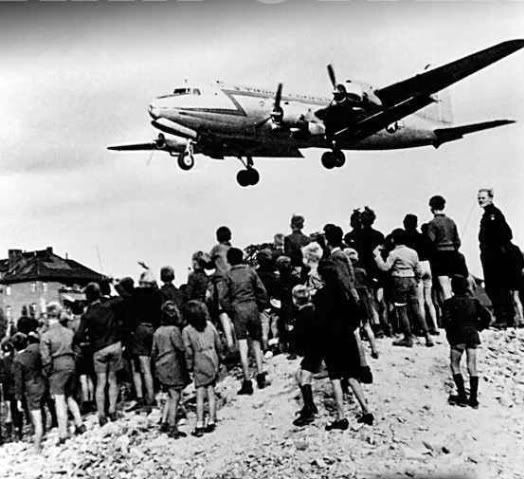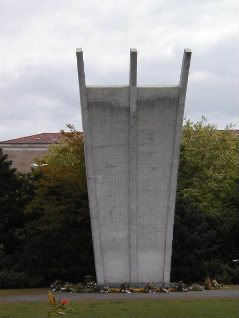While my dad was in the Army, I had the opportunity - albeit without a choice - to move around a lot and see a lot of the U.S. and the world. Of all the places we lived, there's no doubt in my mind that the two years we lived in West Berlin made the biggest impact on my life, my future, and how I've come to view the world in my lifetime.
We arrived in late 1979, just after my 5th birthday. I flooded my parents with questions about The Wall, the Russians, why people couldn't live together, all the other things I couldn't quite understand at the time. By the time we returned to the States, I had grown to understand a lot of the history, culture, and politics of the city. But it was only years later that I began to fully understand and appreciate one of the greatest humanitarian efforts in modern history - the Berlin Airlift.
It was 60 years ago that the Soviet military blockaded Berlin, shutting down rail, road, and boat traffic to the city. General Lucius Clay, who was appointed as the civil/military governor for the occupied zone, rightly concluded that leaving Berlin would be the wrong thing to do. Although the the Soviets would likely resolve all "technical difficulties" causing the blockade immediately, it would be a huge loss of prestige for America - not just her government leadership, but her military as well. All this, not to speak of how the lives of two million Germans could be changed forever.
Now, keep in mind that I hate math, statistics, and having numbers thrown in my face to make a point. But in this instance, I think the numbers give a good basic understanding of how monumental this effort truly was. On 24 June, 1948, there was enough food in the city to last 35 days, and 45 days' worth of coal. The next day, 32 US aircraft flew in 80 tons of supplies. Four days later, the RAF began flying in supplies as well. Based on numbers generated by Clay and legendary Air Force General Curtis LeMay, American and RAF pilots in C-47s, C-54s, RD-5s, DC-4s, and the venerable Avro York began flying almost 278,000 sorties in and out of the city that would continue for 15 months. 2.3 million tons of food and supplies were taken into the city, at the rate of roughly 5,000 tons per day loaded at 3-4 tons of cargo per flight, depending on aircraft type - the larger birds held around 10 tons. Tempelhof Airport had aircraft touching down every ninety seconds for the bulk of that 15-month period.
The picture I'm painting here (and the definite impression that I have of the Airlift) is one of constant activity, countless moving parts, and true selfless dedication to accomplish a mission - in this case, helping Berliners to not only keep their city, but live life as they had prior to the blockade. I'd imagine one other big factor in those very early days of the Cold War was being able to roll up your sleeves as part of a team and give the Russkies a big one-fingered wave while you were at it. Despite all this, the pilots who flew these missions knew how vital every single flight was - particularly the first flight, piloted by the late Jack Bennett. I can only sort of imagine what it's like knowing that you'll be on the ground again in an hour, yet still wondering if it'd be wheels down or in a burning heap of potatoes and avgas.

This, to me, is THE PICTURE of the Berlin Airlift. I saw it a lot as a kid, all over Berlin - it is to the Airlift what the Suribachi picture is to the Marine Corps.
What really drives home the significance of the Airlift for me is that to this day, all Germans - and Berliners in particular - remain grateful for what the American and British pilots did for them. Tempelhof Airport, one of the very few remaining structures that was built ground-up by Hitler's Reich, became an icon of the Airlift. I'll tell you something - when you have lifelong residents of the city which was the beating heart of the Nazi regime actually fighting to preserve something the Nazis built - that speaks volumes about what Tempelhof represents in their hearts. Sadly, their efforts failed and Tempelhof will soon be swept aside for a larger Berlin airport.
Maybe I'm talking out of my ass, but I think Berliners in general would call it a travesty that most Americans never heard of the Berlin Airlift. I know it pisses me off a little bit. Just to narrow it down further from my perspective, as a serving member of the Armed Forces: there are many proud moments, legendary battles, and timeless heroes who have formed a legacy that I strive to carry on every day I put on this uniform. For my money - and especially in light of America's post-Korea views of her military - you'd have to dig pretty deep to find an operation more selfless, more righteous, and more deserving of respect and admiration than the Berlin Airlift. Regardless of the circumstances or the politics surrounding the entire affair, it came down to American and British fighting men putting their lives on the line to help two million strangers keep their own.
If that's not as good as it gets, I really don't know what is.

The three prongs represent the only three air corridors opened for flights to & from Berlin during the Blockade; they remained the only three air routes authorized for Allied/NATO and commercial traffic until the wall fell in 1989.